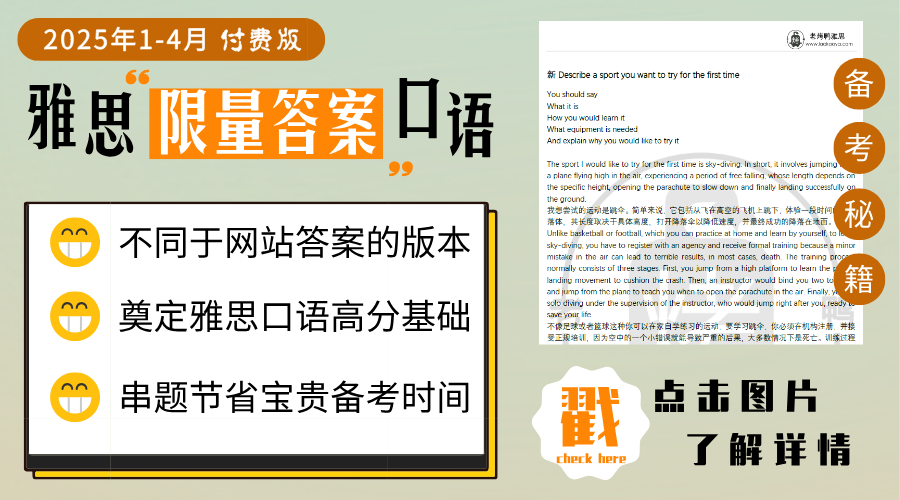雅思口语Part2话题卡:Describe an important thing you learned (not at school or college) 描述你学到的重要的事情(不在学校/大学)
思路点拨:以下思路仅供参考,希望大家能结合自己的经历编写答案
这道题目有两个限定,分别为important和not at school or college。前者很容易满足,毕竟任何东西在特定的条件下都会变得重要起来。而后者则排除了学术类的知识。从这两点出发,大概的扩展方向可以有以下几种:重要的技能(修车,滑雪,修家电,学校未曾教授的语言等),重要的人生经验(如何与人打交道,如何面对失败),以及重要的知识(比如以前的氢气球不能靠近火源,熄灭酒精灯不能吹等)。
题目
Describe an important thing you learned (not at school or college)
You should say
What it was
When you learned it
How you learned it
And explain why it was important
参考答案
下面给老烤鸭小编根据具体的题目要求,给出的原创参考答案:
请北京新航道,上海新航道,沈阳新航道,小站雅思,阿卡索外教网,百利天下留学以及智课网等机构不要再次抄袭本站的文章。
The skill I am going to tell you about is Russian. Decades ago, when the Soviet Union still existed, and the Sino-Soviet relationship was on its honeymoon, it used to be the first choice when Chinese people wanted to learn a second language. But ever since the collapse of the country, this language has lost its popularity and become a skill mastered by a fraction of people.
我要告诉你的技能是俄语。数十年前,当苏联还存在,中苏关系处于蜜月期的时候,它曾经是中国人学习外语时的第一选择。但自从苏联解体,这一语言就不再流行,成为一种只有少数人才掌握的技能。
I learned it from a senior citizen in a language center outside my university three years ago. He was already approaching 70 but was still energetic and had an acute mind. According to him, he received his education at Moscow University and had been doing research on Russian culture after graduation. After retirement, he hoped to take advantage of his knowledge to help others gain a better understanding of our neighbor, so he took this job at the center.
我是从校外一家语言中心的老人那里学的它。他已经快70岁了,但仍然精力充沛,思维敏捷。根据他的说法,他在莫斯科大学接受的教育,毕业之后一直从事俄罗斯文化的相关研究。退休之后,他希望利用自己的知识帮助其他人更好的了解我们的邻居,因此做了这份工作。
His class was distinctive from the one I was familiar with, where we needed to memorize a lot of grammar and words. Instead, it was full of interesting activities. For example, he rarely told us the meaning of the words directly but employed exaggerated moves and relevant pictures to let us figure them out by ourselves. This article is from laokaoya website. Moreover, speaking accounted for a large part. He would do drills and one-on-one tutorials, and then encourage us to communicate with each other. It was really impressive.
他的课堂跟我过去熟悉的那种需要记忆大量语法和单词的课堂完全不同。恰恰相反,它充满了各种各样有趣的活动。例如,他很少直接告诉我们单词的含义,而是利用夸张的表演和相关的图片让我们自己猜出来。此外,口语也占很大一部分。他会进行跟读,一对一辅导,并随后鼓励我们互相交流。非常让人印象深刻。
Mastering Russian opened my eyes to this great country. It turns out Russia has done a marvelous job in architecture, religion, art, mathematics, and a wide range of other scientific areas. Without it, the dazzling civilization of humankind will lose half of its amusement. I feel really lucky that I learned this skill.
掌握俄语让我注意到这一伟大的国家。原来,俄罗斯在建筑、宗教、艺术、数学和其他许多科学领域都做出了自己的贡献。没有它的话,人类璀璨的文明会失去一半的魅力。我很庆幸自己学习了这一技能。
Part 3 追加问题
What can children learn from their parents?
Do you think some children are well-behaved because they are influenced by their parents?
Is it necessary for adults to learn new things?
How can people learn new things?
点击查看2023年1-4月雅思口语题库Part2其他话题卡答案


